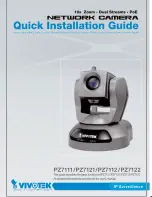
Chapter 7
The SpeedTouch™ File System
E-DOC-CTC-20051017-0155 v1.0
75
7 The SpeedTouch™ File System
Introduction
The SpeedTouch™ file system exists of nonvolatile memory responsible for storing,
retrieving and maintaining the system software files, configuration profile files,
language-pack files, software activation keys, secure storage files, etc.
The file system of the SpeedTouch™ is accessible via the well known File Transfer
Protocol (FTP). This allows to backup and restore files present on the SpeedTouch™
file system. Moreover, via FTP's
quote site
command you are able to use a
limited set of CLI commands from the FTP prompt.
Opening an FTP session
to the SpeedTouch™
Proceed as follows to open an FTP session to the SpeedTouch™ file system (the
example shows an ftp session opened from an MS Windows Command Prompt):
In its default firewall configuration, FTP access to the SpeedTouch™ file system is
restricted to access from the local network only.
File system structure
The file system features a tiny multilevel directory structure with two nodes '/active'
and '/dl'.
The root directory is secured and contains two subdirectories ‘/active’ and ‘/dl’.
The ‘/active’ subdirectory contains the system software in execution. Other files
may be present to ensure the good operation of the device, or due to previous
system software upgrades.
The ‘/dl’ subdirectory is the directory where you can find a user.ini file, holding the
most recently saved SpeedTouch™ configuration. The ‘/dl’ subdirectory also
contains the passive (dormant) system software (in most cases the passive system
software will be the same as the active system software present the ‘/active’
subdirectory. Optionally, the ‘/dl’ subdirectory may contain software activation keys
for enabling SpeedTouch™ software modules, language pack files and template
files. Other files may be present as well to ensure the good operation of the device.
In the example above the default SpeedTouch™ IP address 192.168.1.254 is
assumed, however another IP address may be assigned to your
SpeedTouch™ device.
There may be a user.ini file present in the ‘/active’ subdirectory. However,
this user.ini only contains the saved configuration since the last software
switchover, and hence may be not up-to-date.
Summary of Contents for SpeedTouch 620
Page 2: ......
Page 3: ...SpeedTouch 620 Operator s Guide...
Page 10: ...Contents E DOC CTC 20051017 0155 v1 0 vi...
Page 12: ...About this Operator s Guide E DOC CTC 20051017 0155 v1 0 2...
Page 14: ...Chapter 1 Introduction E DOC CTC 20051017 0155 v1 0 4...
Page 24: ...Chapter 2 SpeedTouch Command Line Interface E DOC CTC 20051017 0155 v1 0 14...
Page 54: ...Chapter 4 SpeedTouch Configuration Management E DOC CTC 20051017 0155 v1 0 44...
Page 84: ...Chapter 6 SpeedTouch System Services E DOC CTC 20051017 0155 v1 0 74...
Page 122: ...Chapter 8 SpeedTouch Remote Access E DOC CTC 20051017 0155 v1 0 112...
Page 202: ...Chapter 11 SpeedTouch Advanced Diagnostics E DOC CTC 20051017 0155 v1 0 192...
Page 212: ...Chapter 12 SLA Monitoring E DOC CTC 20051017 0155 v1 0 202...
Page 215: ......
















































